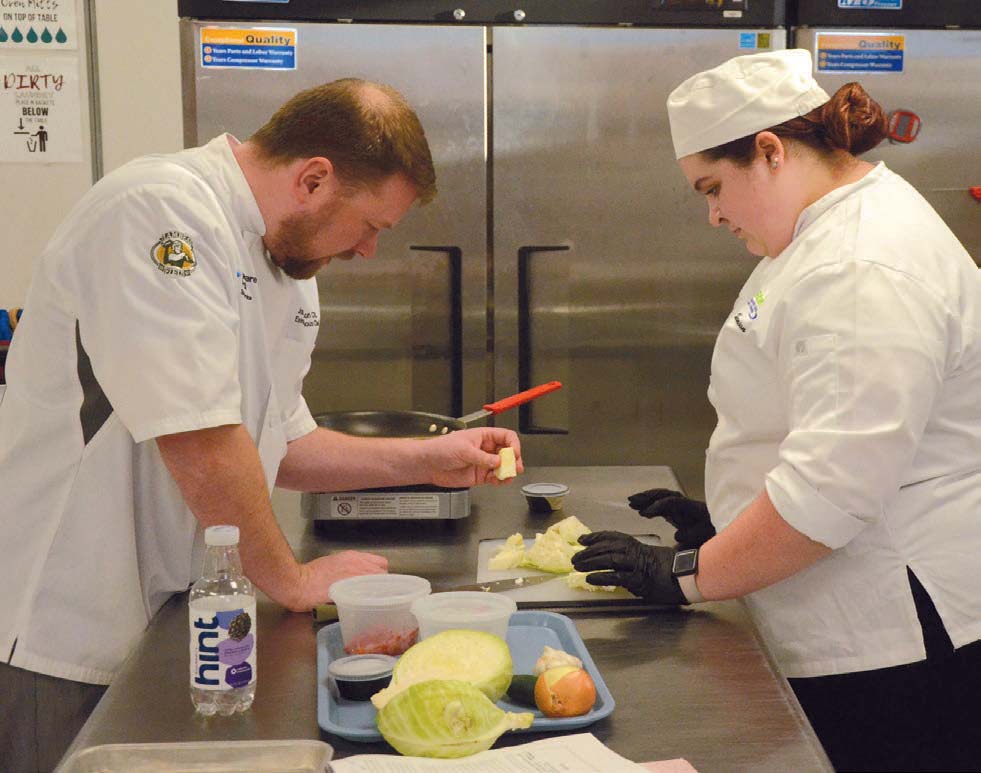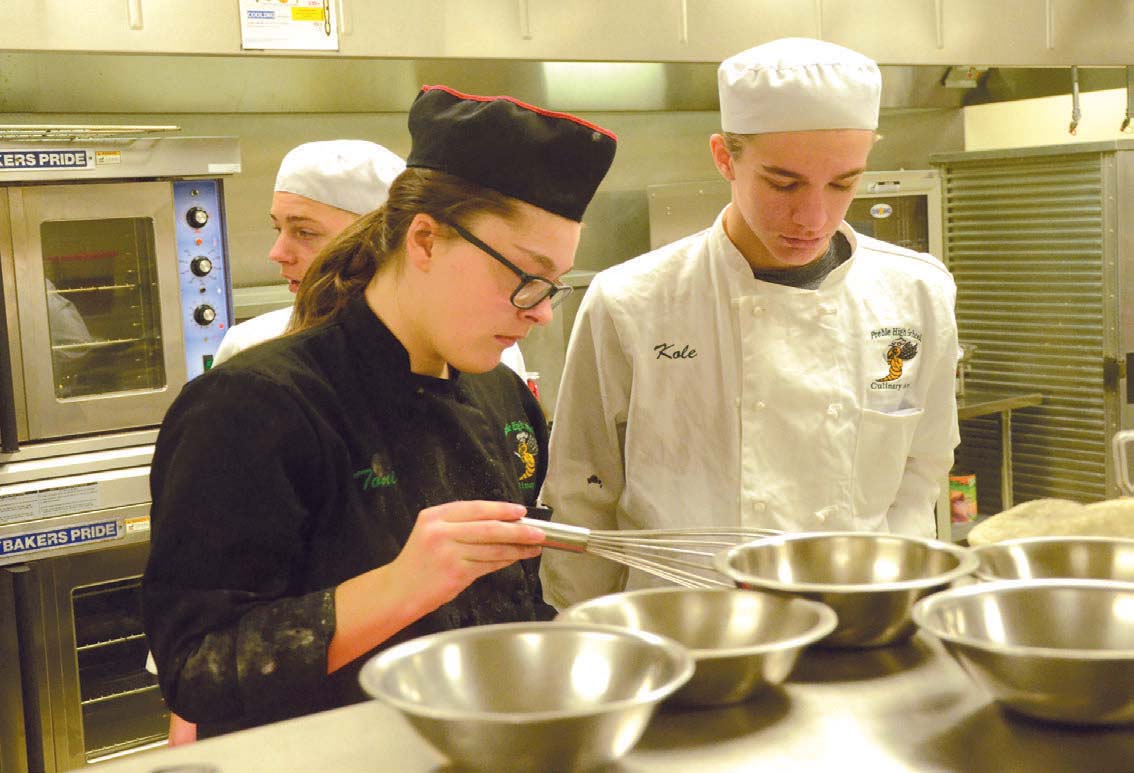High Schoolers get a Foot Up in the Culinary Business
Students looking for a great career need look no further than the kitchen. The U.S. Bureau of Labor Statistics estimates demand for chefs and head cooks to grow by 11 percent by 2028 and to that end, Wisconsin high schools are teaming up with the National Restaurant Association’s ProStart program to give high school students a head start in the restaurant industry. Through the Wisconsin Restaurant Association, ProStart is in 100 high schools statewide.
Pulaski High School (PHS) has offered the ProStart curriculum for 19 years, and Liz Moehr has been its instructor for 18 years.
“If students complete the two-year program and have 400 hours of mentored work experience, they get college credit,” Moehr explained.
The first course in the program is “Food for Life,” where students learn how to cook from scratch, while other courses include baking and pastry arts, world culture cuisine, and food science. Delaware North, the food service company that serves Lambeau Field, is one of the ProStart sponsors at PHS, and two of its executive sous chefs, Josh Swanson and Zak Ladubec, are one-on-one mentors for the Pulaski students.
The young chefs are encouraged to decide what they want to prepare since that will be a task they face in the real world.
“Their favorite most recently was a Schaum torte with a strawberry coulis, which is a strained fruit sauce,” Moehr said, “So much so that they wanted a lab just to make coulis, and that’s what we’re going to do this week.”
Moehr puts a lot into her work at PHS. While having taught a number of different classes, she found her passion in the culinary arts. “It’s exciting to see how creative the students can become and how seriously they take it,” she said.
So what do students say is the best dish they created this semester? For sophomores Danielle Rusch and Kara Thompson, hands-down, it’s Bang Bang Shrimp Tacos.
“We marinate the shrimp in taco spice,” Kara explained. “Then we fry the shrimp in the pan. We shred red and green cabbage and make a mayonnaise dressing flavored with cumin and other seasoning.” Danielle added, “You really don’t taste the mayo – it just balances out with the cabbage. ”
A pico de gallo is then used for a topping on the crunchy fried shrimp. A side salad of diced jicama and mango with a dressing of honey, lime juice and spices completes the dish.

Chef Josh Swanson from 1919 Restaurant works with student Kara Thompson on her knife skills as she chops cabbage at Pulaski High School.
EYEING THE NATIONAL PROSTART INVITATIONAL
When the bell rings at 3 p.m., ending the school day, many students head to the gym for athletic practice, others may go to a part-time job or head home. But Kara and fellow student Evan Jacobetti come into the kitchen carrying everything they need to practice their contest entry in the Wisconsin ProStart Invitational. The contest was scheduled for Wednesday, March 10, as part of the Midwest Food Expo at the Wisconsin Center in Milwaukee. Winners receive scholarships and a trip to the National ProStart Invitational.
The culinary event has teams of four students who have one hour to prepare a three-course meal and are judged on their knife skills, teamwork, sanitation, safety, menu presentation and taste.
The management event has teams up to four students developing a business proposal for a new restaurant concept, creating posters, answering critical thinking questions and presenting their concept to judges. Dishes for this year’s competition are focusing on Latin and South American cuisines.
This is where the mentorship of 1919 Restaurant Executive Sous Chef Swanson comes in. Born and raised in Green Bay, Swanson worked his way up to a sous chef position at Hinterland Restaurant in Green Bay, then, after moving to 1919, agreed to take the Pulaski mentor position as the previous mentor had recently left.
“The kids came in that year and practiced in our kitchen,” Swanson recalled. “The teacher wanted to get them out of the school environment and into an environment where they had to load up their product and their equipment, then unload it and prepare a kitchen.”
That began an ongoing mentor relationship with the Pulaski students. Swanson gives high marks to Moehr and the job she’s doing at Pulaski.
“ProStart goes as far as you take it, and Liz does an amazing job of helping the students,” he continued. “It’s some hand-holding and some pushing to get where they want to go. We sit down with the kids and ask them what they want to make. Liz has some students who have made a dish or bring ideas to the table. Then we can refine those ideas.”
After tryouts and the teams are selected, Swanson works with the students weekly to hone their cooking skills and is in frequent email conversation with them. Once the menu is set and equipment selected, Swanson said the pace picks up fast leading up to the Food Expo in Milwaukee.
“The kids have to walk in with a cooler and pull all their equipment out of it and put it on the table,” he explained. “They have to be prepared mentally for that because there’s an ‘x’ amount of time to do that. All the ingredients have to prepared before the cooking actually begins.”
Halley Dellemann graduated from PHS in 2018 and is now working at 1919 where she is an upper-tier line cook.
“I prep in the morning and work serving lunch through the day. The courses definitely gave me more insight when I applied for the job,” she said. “Cooking was always my outlet so it was nice to find something to go into.” She adds the courses at Pulaski High School helped prepare her.
Swanson is enthusiastic. “With Prostart I can see a better career path versus going from an internship to the culinary school level; when they do that, they’re making a jump where I think they need to space that out a little more,” Swanson said. “They don’t always realize they’re going to work nights and weekends, that they’re going to miss family birthdays and holidays, and they don’t always realize the fast-paced environment that it’s going to be.”
PREBLE WAS THE FIRST
Preble High School in Green Bay is the second-largest high school in Wisconsin, and its culinary arts program was the first ProStart school in the state, starting in 1998. The overall emphasis is a bit different at Preble, with the students catering many of the events held at the school and providing service to a number of organizations in Green Bay.
“Last night we catered the cross-country team’s banquet for 165 people,” program teacher Laurie Spence said. “So instead of going out to a restaurant, they booked it with us and we held the event here. We did two menus for them and served them buffet-style in the commons. So eight kids served 165 people, which to be honest with you is pretty amazing. We’re licensed as a restaurant, and we have the same inspections as anyone else. Most of what we do gives back to the community and contributes to other organizations.
“We were at ‘Taste of the Town,’ a fundraiser for Big Brothers Big Sisters Friday night,” she added. “This Friday we’re going to be dropping off a dessert at Hotel Northland, and the kids are going to serve it Saturday night. We’ve started prepping it, and they will bring all the components of the dessert over, already done, and they will plate it over there Saturday night to about 225 people for ‘Hand-in-Hand,’ a birth-to-school-age group for hearing-impaired children.”
The students also provide apple pies to elderly neighbors, a tradition that goes back about 20 years.
“There’s an apple tree on our school grounds,” Spence explained. “The kids were getting in apple fights, so the principal came to me and said, ‘Can you do something with those apples?’ So every year we pick it clean. We make about 100 pies and donate them to homeless shelters around the area. Elderly residents near the school also benefit by being on the students’ apple pie list.”
Occasionally, the students are called upon to help out in emergencies.
“We’ve had apartment fires in the area,” she recalled. “They’re typically displaced to one of the elementary schools or the high school. It can be 100 people when you get these apartment fires, so they notify us right away and we immediately stop what we’re doing and check out what we have on hand; the kids divide up into groups, so we brainstorm for five or 10 minutes and we’re in the kitchen making it. We’ll feed the people for as long as it is needed. One time it was for a day, but other times it is much longer. During the flooding last spring, they fed evacuees for a week.”
Lab assistant Alex VandenLangenberg helps Ms. Spence run the class. “I assist the kids who need help,” he said. “If their peers can’t help, they ask me, and if I don’t know the answer, I ask the teacher. If a kid is having trouble, I’ll work one-on-one with them.”
Alex has a couple possible tracks for his future. He hopes to one day have a farm and use the farm to create his own restaurant, but is also considering law enforcement as a career.
“This course has taught me how to cook and fend for myself,” he added. “It also teaches how to plan for large-scale and small-scale events. It’s taught me a lot of life skills — how to be responsible, get your stuff done on time, using your time correctly and working with others.”
With the high volume of events and tasks, Spence runs a tight ship in the commercial-grade kitchen. As students file in for a morning class, she chides a couple of them for not showing up at the preceding night’s event.
“I believe the most important thing I do is prepare my students to become well-rounded individuals who contribute to society,” she said.





